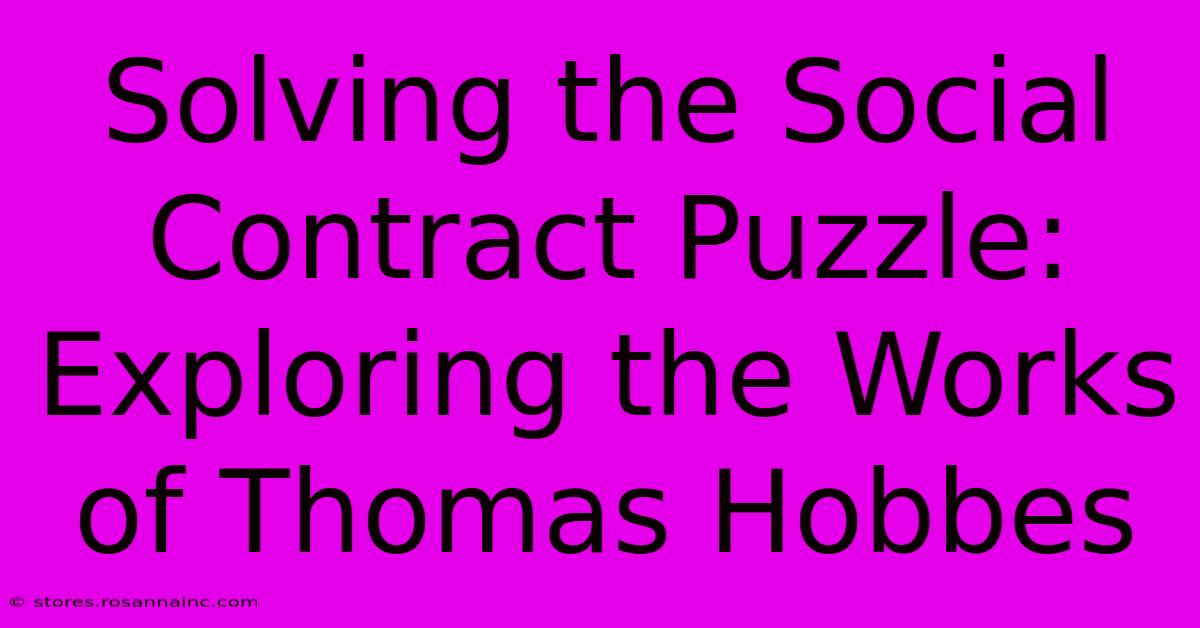Solving The Social Contract Puzzle: Exploring The Works Of Thomas Hobbes

Table of Contents
Solving the Social Contract Puzzle: Exploring the Works of Thomas Hobbes
Thomas Hobbes, a towering figure of 17th-century philosophy, remains profoundly relevant today. His masterpiece, Leviathan, grapples with fundamental questions about human nature, society, and the state, offering a stark yet compelling vision of the social contract. This exploration delves into Hobbes's ideas, examining their enduring impact and the ongoing debates they inspire.
The State of Nature: A Brutal Beginning
Hobbes famously posited a "state of nature" preceding organized society. This isn't a romanticized vision of noble savages; instead, it's a brutal landscape governed by a relentless "war of all against all." Individual self-preservation, fueled by insatiable appetites and the ever-present fear of death, dictates human behavior. In this anarchic realm, there are no moral laws, no justice, and life is "solitary, poor, nasty, brutish, and short."
The Implications of Self-Interest
This pessimistic view of human nature stems from Hobbes's belief in the inherent self-interest driving individuals. He argues that rationality itself compels individuals to pursue their own survival and power, leading to constant conflict. Competition for resources, glory, and power become the driving forces in this state of nature. The absence of a higher authority creates a system where the strong prey upon the weak, with no recourse for the oppressed.
The Social Contract: Escaping the State of Nature
To escape this perilous existence, Hobbes argues, individuals must enter into a social contract. This contract involves surrendering certain individual rights and liberties to a sovereign power – a Leviathan – in exchange for security and order. This sovereign authority, whether a monarch or an assembly, holds absolute power to enforce laws and maintain peace. Without this absolute authority, Hobbes argues, the state of nature's chaos would inevitably return.
Absolute Sovereignty: The Price of Peace
Hobbes's emphasis on absolute sovereignty is a direct consequence of his pessimistic anthropology. He believes that any limitations placed on the sovereign's power would inevitably lead to a breakdown of order and a relapse into the state of nature. The sovereign's power is not based on divine right or popular consent but on the necessity of maintaining peace and security. Individual rights, while important, are subordinate to the overarching goal of societal stability.
The Leviathan's Legacy: Lasting Influence and Criticisms
Hobbes's Leviathan has had a profound and lasting impact on political thought. His concepts of the social contract, the state of nature, and the absolute sovereign have been debated and refined by generations of philosophers, shaping discussions about the nature of government, rights, and obligations.
Enduring Relevance
Hobbes's work remains relevant in contemporary discussions surrounding security, power, and the limits of individual liberty. His insights into human nature and the potential for societal breakdown continue to resonate in a world grappling with conflicts, inequalities, and the ever-present threat of violence. Understanding Hobbes helps us better grasp the complexities of maintaining social order and the delicate balance between individual freedom and collective security.
Criticisms and Alternative Perspectives
However, Hobbes's philosophy has faced significant criticism. Many argue that his pessimistic view of human nature is overly simplistic and ignores the potential for cooperation and altruism. The concept of absolute sovereignty has also been challenged as potentially authoritarian, leading to the suppression of individual rights and freedoms. Alternative theories, like those of John Locke and Jean-Jacques Rousseau, offer more optimistic and nuanced accounts of the social contract, emphasizing individual rights and the role of popular sovereignty.
Conclusion: A Necessary Dialogue
Thomas Hobbes's Leviathan remains a crucial text for understanding the fundamental questions of political philosophy. His bleak yet compelling vision of the state of nature and his advocacy for a powerful sovereign have profoundly influenced political thought. While his ideas have been subjected to significant criticism and alternative interpretations, grappling with Hobbes's work is essential for navigating the ongoing debate about the nature of government, the balance between individual liberty and collective security, and the ever-present challenge of building a just and stable society. By engaging with his ideas, we can better understand the enduring puzzle of the social contract and its implications for our world today.

Thank you for visiting our website wich cover about Solving The Social Contract Puzzle: Exploring The Works Of Thomas Hobbes. We hope the information provided has been useful to you. Feel free to contact us if you have any questions or need further assistance. See you next time and dont miss to bookmark.
Featured Posts
-
The Orients Pearl A Story Of Resilience
Feb 10, 2025
-
From Tech Pioneer To Visionary Remembering Adam Clayton Powell Iii
Feb 10, 2025
-
Is Dave Chappelle The Richest Comedian
Feb 10, 2025
-
Stress Free Cape Cod Conquer Bourne Bridge Traffic
Feb 10, 2025
-
Tom Brady Snoop Dogg Super Bowl 2025
Feb 10, 2025
